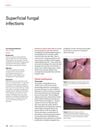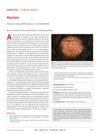TLDR Early recognition and treatment of tinea capitis are crucial to prevent severe scalp issues and prolonged therapy.
Tinea capitis, a fungal scalp infection primarily affecting children, presents diagnostic and therapeutic challenges due to its varied clinical manifestations and changing epidemiology influenced by global migration. Effective treatment requires systemic antifungal therapy, with drugs like griseofulvin, terbinafine, itraconazole, and fluconazole, and careful monitoring of liver function due to potential adverse effects. The document highlights the importance of early recognition and treatment to prevent severe outcomes like permanent scarring and alopecia, and underscores the need for accurate diagnostic methods and understanding of genetic resistance mechanisms. Case reports illustrate the complexity of managing this condition, emphasizing the necessity of tailored treatment regimens and further research on emerging pathogens and zoonotic transmission.
 54 citations
,
October 2019 in “Australian Journal of General Practice”
54 citations
,
October 2019 in “Australian Journal of General Practice” Accurate diagnosis and treatment are crucial for managing superficial fungal infections, with terbinafine being the best oral treatment for nail infections.
 10 citations
,
May 2017 in “CMAJ. Canadian Medical Association journal”
10 citations
,
May 2017 in “CMAJ. Canadian Medical Association journal” The boy had a fungal scalp infection called kerion, which was cured with oral antifungal medication.
196 citations
,
November 2014 in “PubMed” Tinea infections need proper diagnosis and treatment with topical or oral antifungals based on severity and location.
 156 citations
,
September 2014 in “British journal of dermatology/British journal of dermatology, Supplement”
156 citations
,
September 2014 in “British journal of dermatology/British journal of dermatology, Supplement” Accurate diagnosis and effective oral treatment are key to managing tinea capitis and preventing its spread.
13 citations
,
December 2012 in “Medical mycology case reports” Misdiagnosis led to permanent hair loss, stressing the need for proper scalp tests.
 June 2008 in “Springer eBooks”
June 2008 in “Springer eBooks” The document concludes that permanent hair loss conditions are complex, require early specific treatments, and "secondary permanent alopecias" might be a more accurate term than "secondary cicatricial alopecia."
 January 2025 in “Journal of Fungi”
January 2025 in “Journal of Fungi” Advanced dermoscopy techniques improve diagnosis and treatment monitoring for Kerion celsi but don't guarantee full hair regrowth.
 April 2019 in “Journal of Medical Science And clinical Research”
April 2019 in “Journal of Medical Science And clinical Research” The grey patch variant of tinea capitis is most common, mainly spread through family and animals.
 2 citations
,
January 2022 in “Eduvest”
2 citations
,
January 2022 in “Eduvest” A teenage girl with a fungal scalp infection got better with antifungal and allergy medication, and special shampoo.
 January 2022 in “Eduvest”
January 2022 in “Eduvest” A teenage girl with a fungal scalp infection got better with antifungal and allergy medication, plus medicated shampoo.







